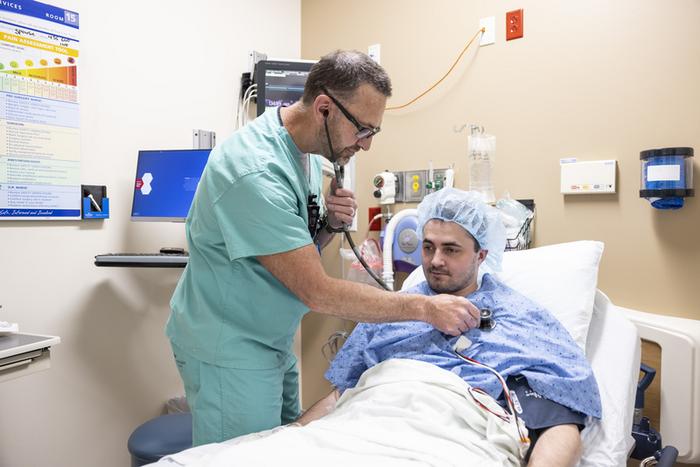New research from Intermountain Health in Salt Lake City finds that genetic screening is effective in identifying patients who have a heart condition known as cardiomyopathy to improve their quality of life and reduce deaths.

Credit: Intermountain Health
New research from Intermountain Health in Salt Lake City finds that genetic screening is effective in identifying patients who have a heart condition known as cardiomyopathy to improve their quality of life and reduce deaths.
By undergoing genetic screening to identity those with the potentially-fatal heart condition, clinicians can more closely monitor them and use medical interventions, when necessary, that could improve the quality of these patients’ lives, and potentially save them, researchers say in a new study of more than 30,000 heart patients.
“Our findings show that we’re missing a large percentage of the population that’s walking around with a genetic predisposition to a devastating kind of heart disease,” said Kirk Knowlton, MD, lead author of the study and director of cardiovascular research at Intermountain Medical Center. “Widespread genetic testing can identify these patients, and their families, which means we can better treat them.”
In its different forms, cardiomyopathy – which affects the heart’s ability to pump blood – can stiffen the muscles of the heart, enlarge them, and/or weaken them, which can lead to irregular heartbeat, heart attack, and even death. Some types of cardiomyopathy are acquired, and caused by another disease condition like muscular dystrophy or alcoholism; and about half of cases are genetically inherited.
Findings from the Intermountain study were presented at the American Heart Association’s Scientific Sessions 2023 national conference in Philadelphia on Nov. 12, 2023.
This study is part of the HerediGene: Population Study, the world’s largest DNA mapping initiative, which is a partnership between Intermountain Health and Icelandic company deCODE.
The goal of the project is to discover new connections between genetics and human disease. When appropriate, it’s also providing genetic screenings for participants so they know about their risks of disease development, and what actions they can take to protect their health.
Inherited cardiomyopathy is one of the diseases tested for, via identification the pathogenic TTN variant, which affects the gene that creates a protein in cardiac muscle.
In the study, Intermountain researchers looked at the first 32,159 sequenced patients, and found 411 with a pathogenic/likely pathogenic TNN variant. Of those, 135 (32.8%) had a cardiomyopathy diagnosis, and 276 (67.2%) did not.
In total, researchers found that about one third of patients with potential pathogenic TNN variant had a cardiomyopathy diagnosis; and 27% did not but had an indication of it.
They also found that demographic and clinical characters were significantly different among those without and without a cardiomyopathy diagnosis. In those without, 75 (27%) had one or more clinical indications of cardiomyopathy. Of those with an indication of cardiomyopathy but without a diagnosis, 12 (16%) had died, and 22 (23%) had been hospitalized for heart failure.
These findings stress the importance of more accessible whole genome testing, say Intermountain researchers.
“If we know someone has this genetic variant, we can make a difference for that person and their families.,” said Dr. Knowlton. “But we won’t know who should receive this kind of monitoring if we don’t know who they are,” he added. “Genetic testing can help us with that.”
By undergoing testing and identification, those who have the genetic variant would then be monitored more carefully with regular echocardiograms, at younger ages, and as soon as they start showing signs of the disease, and receive the standard of cardiomyopathy of care, researchers say.
###
Method of Research
Observational study
Subject of Research
People




